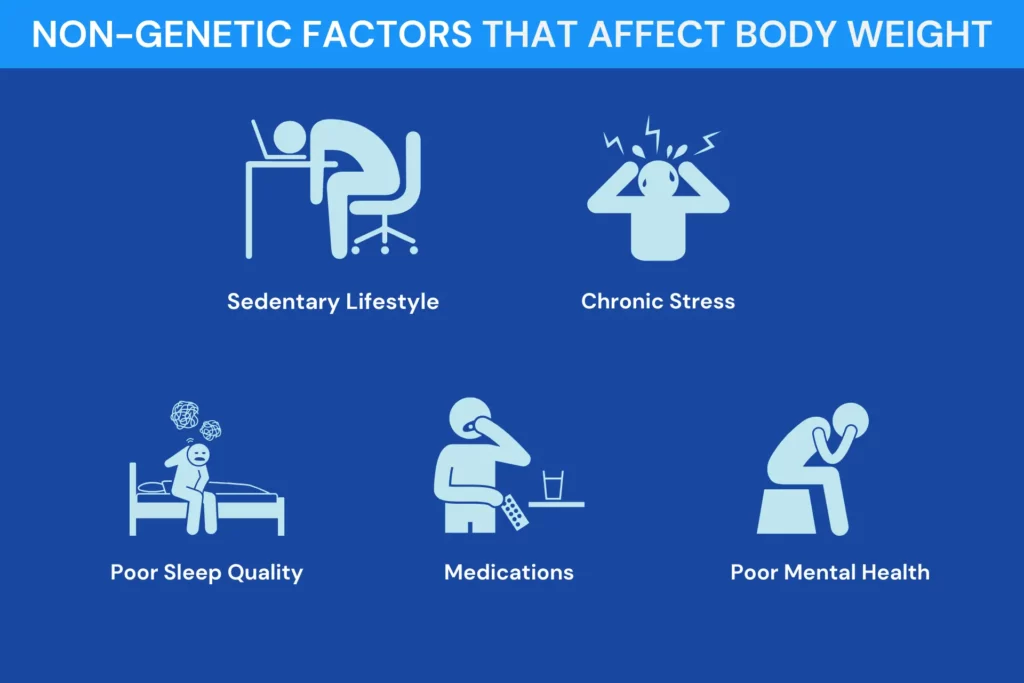If you’ve ever wondered how people who eat healthy struggle to lose weight but people with the most unhealthy diets maintain a healthy weight, you’re in the right place. A complex interplay of several environmental and genetic factors determines your body weight. Environments may change, but your genetic makeup is unique to you. Getting a genetic test for weight loss is a great way to help you understand your health better, allowing you to make the right dietary choices.
Why Genetic Testing For Weight Loss?
For a long time, we’ve assumed that weight gain and loss depend almost entirely on our lifestyle.
Eat unhealthy foods and put on weight, eat healthier and watch the scale go down.
It may not be as simple as that anymore.
Now, researchers study the genetics of weight in greater detail.
A study surveyed the genetic background of patients who had undergone weight loss procedures.
The study revealed that genetics played a role in determining the procedure's long-term effectiveness.
The authors also suggested that genetic screening of people with obesity can help recommend a personalized and cost-effective treatment option that would benefit the patient in the long term.
Why Not Just Healthy Habits?
Suitable lifestyle modifications can help combat weight fluctuations.
Regular exercise and a refined diet have a significant impact on body weight.
In addition, habits like meditation to manage stress and a good sleep schedule can further help with weight loss.
Interestingly, how you respond to these healthy habits is influenced by your genes.
For example, dieting and a new sleep schedule work best for person A, while person B benefits more from regular exercise and meditation.
Your genetic makeup can determine which routine would impact your health more strongly.
Thus, getting a genetic test for weight loss is the best way to kickstart your wellness journey.
Do Genetic Factors Influence Your Weight?
The short answer is yes.
However, no single “weight loss” gene directly controls the trait.
Your weight also indirectly depends on how you process food, adapt to exercise, handle stress, and more.
Your genetic makeup can answer all these questions:
- How well do you digest carbohydrates, proteins, and fats?
- Are you more likely to snack, overeat, or seek out food for comfort?
- How easily do you regain lost weight?
- Are you better suited to dieting or exercising?
- What weight gain-inducing health conditions could you be at risk for?
Other Factors Influencing Your Weight
Your genes aren’t entirely responsible for your body weight.
Factors from your environment and lifestyle contribute to weight gain, too.
Some of these non-genetic factors include:
- Sedentary lifestyle: Your body burns idle calories when standing, swaying, or fidgeting. Remaining sedentary prevents this and contributes to weight gain.
- Poor sleep: On a sleepy day, you’re more likely to choose unhealthy foods to stay alert. A lack of energy can harm your exercise routine. These factors can cause weight gain.
- Medications: Sudden weight gain is a known side effect of steroids, beta-blockers, antidepressants, and contraceptives.
- Poor mental health: Your mental health and body image are linked. A hit to one can tank the other by enabling unhealthy choices. Depression can lead to overconsumption of comfort foods, and stress can mess with your hunger hormones.

Does Genetic Testing For Weight Loss Work?
Genetic testing for weight loss can help:
- Curate your diet better towards nutrients that you digest easily
- Adjust your fitness routine, including exercises that work better for you
- Select a bariatric procedure that can help manage your weight in the long term
- Modify your lifestyle to avoid diseases like hypothyroidism that can cause weight gain
While lifestyle-related traits are easily noticeable, genetic traits aren’t immediately apparent.
For instance, you could trace a spike in weight back to a lack of exercise or a snacking spree in the recent past.
However, if you aren’t seeing enough results from your workout routine, you won’t be able to isolate the culprit genes.
That’s where genetic testing comes in.
Genetic testing can help you optimize your lifestyle, making your current diet and exercise routine more effective.
Healthy habits help, and genetic testing can augment them further.
How Much Does Genetic Testing For Weight Loss Cost?
Genetic testing for weight loss includes:
- Collecting a sample of your DNA
- Analyzing your DNA
- Returning your computerized DNA data
- Submitting this DNA data to genetic testing companies that offer weight loss reports
Ordering a DNA sample kit can cost up to a few hundred dollars.
Xcode Life offers a detailed, user-friendly genetic fitness test for just $30.
Some companies charge up to $200 for their weight loss-based panels.
Summary: Genetic Testing For Weight Loss
- Weight gain and loss may not be all about your lifestyle and environment.
- Recent studies have shown that genes affect how easily and effectively you lose weight.
- A genetic test could tell you more about your body’s response to your current diet, exercise routine, and medications.
- Streamlining your lifestyle after a genetic test for weight loss could help you see results faster.
- Several companies, like Xcode Life, offer helpful genetic tests for weight loss.
Others Are Also Reading

Could Weight Loss Be The Most Effective Treatment For Sleep Apnea?

Jewish DNA Test: Can Genetic Tests Help Identify Jewish Ancestry?

Common And Rare Side Effects Of Semaglutide For Weight Loss
References
https://www.healthline.com/nutrition/why-sitting-is-bad-for-you
https://www.ncbi.nlm.nih.gov/pmc/articles/PMC9362746
https://www.webmd.com/sleep-disorders/features/lack-of-sleep-weight-gain
https://www.ncbi.nlm.nih.gov/books/NBK537590
https://www.medicalnewstoday.com/articles/depression-weight-gain






